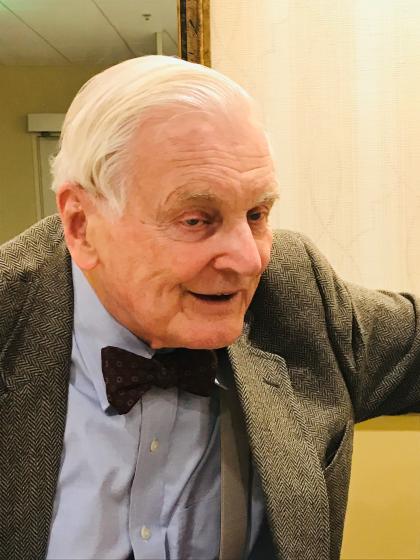Richard A. Goldthwaite, a renowned historian specializing in the economic and social history of Renaissance Florence, died March 4 in Italy at the age of 90.
Professor emeritus in the Krieger School's Department of History, Goldthwaite devoted his career to tracing the cultural, social, and political impacts of Renaissance Florence's economic activities and developments, contributing to scholarly debate about the origins of capitalism and modern consumerism.

Image caption: Richard A. Goldthwaite
"Richard Goldthwaite was an eminent economic historian of Italian cities and he spent much of his retirement in Florence," said Tobie Meyer-Fong, professor and chair of the Department of History. "He visited the department at least annually when he returned to Baltimore and generously extended advice to any and all colleagues planning to visit Italy. He will be well remembered even by those of us who joined the department after his retirement."
Goldthwaite's numerous books and articles explored Renaissance Florence's music, art, agricultural, and construction industries and the economic relationships between patrons and artisans, explaining the complexities of the city's commercial, banking, and artisan sectors. During a 1981 sabbatical in Florence, Goldthwaite discovered a series of leatherbound account books—some dating to the 17th century—that would eventually allow him to publish a 2000 history of Villa Spelman, the Hopkins-owned property atop a Florentine hill, which the Krieger School sold in 2008 to support graduate education.
"As a colleague and teacher, Richard Goldthwaite, like those Florentines whose economic lives he investigated, was intensely critical, but with a sharp wit. His contribution to the history of material culture in early modern Italy was immense and he laid the groundwork for others to challenge or expand, but never ignore," said Elizabeth Cropper, professor emerita in the Department of the History of Art and dean emerita of the Center for Advanced Study in the Visual Arts, National Gallery of Art. "Richard delighted in music more than in the visual arts, and his love of Italy guided his life."
"Richard's lasting legacy rests principally with his many important contributions to the history and society of Renaissance Florence," said Richard L. Kagan, Arthur O. Lovejoy Professor Emeritus of History. "He was also an exacting critic and demanding teacher. Yet the Richard whose memory I especially cherish is that of a person of extraordinary kindness, generosity, and warmth, especially with members of the Department of History's staff; with Livio, the famed gardener of the Villa Spelman in Florence; and with the children of colleagues and friends. I shall never forget the special tour of Florence he organized for our 9-year-old son, Loren, in 1994."
A native of Marion, Indiana, Goldthwaite earned a bachelor's degree in history from Oberlin College in 1955, and spent 1955-56 in Florence on a Fulbright Fellowship. He earned a master's and PhD in history from Columbia University in 1957 and 1965, respectively. From 1957 to 1959, he served in the U.S. Army in Germany. After teaching at Kent State from 1965 to 1968, he arrived at Hopkins in 1968, and was named emeritus in 1998.
He was named a Guggenheim Fellow in 1980, and received the American Historical Association's Howard R. Marraro Prize in 1981. In 1984, he was created a Knight of the Order of Merit of the Republic of Italy. He received the Renaissance Society of America's Nelson Prize in 1989.
"This is another extremely sad day in the passing of a truly great economic, social, and cultural historian of Renaissance Italy and one of the contingent of scholars who placed Hopkins at the national and international forefront of early modern European history," said John Marshall, Leonard and Helen R. Stulman Professor of History. "He was known to be a great and kind supervisor to his graduate students, and an extensive and very thoughtful participant in departmental seminars."
Posted in Arts+Culture
Tagged history, krieger school, obituary







